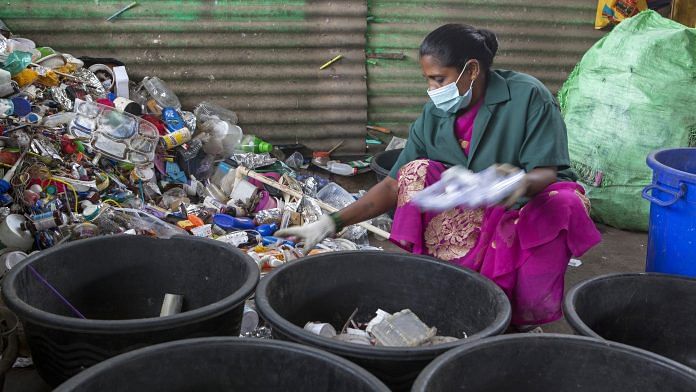When stay-at-home orders shuttered offices across the U.S. last month, one industry was especially hard hit: toilet-paper makers. Just as consumer demand for their product surged during the lockdown, they lost access to the cheap recycled office paper that’s typically used to make toilet rolls. That induced some of the world’s biggest makers to switch to pulp sourced directly from trees, adding significant costs and harming the environment.
It was one small example of the widespread disruption that the virus is causing for the recycling business, and thus for the entire economy. Compared to a lack of mask-making capacity, the role of the humble recycling bin may not seem essential during the coronavirus pandemic. But for many critical industries — including food, packaging and e-commerce — recycled goods are irreplaceable parts of the supply chain.
Recycling has played an important economic role throughout history, of course. Ancient Romans recycled waste from their landfills for use in buildings. American steelmakers imported hundreds of thousands of tons of scrap steel from Europe to sustain the 19th-century railroad boom. During World War II, the U.S. government famously turned to scrap drives to alleviate shortages of raw materials.
Nowadays, recycled material is integral to almost every aspect of the consumer economy. Even leaving the environmental benefits aside, companies prefer such inputs because they save money and energy. About 40% of the world’s raw-material needs are now met via recycling. More than half of all U.S. steel is made from scrap, while the average aluminum beverage can contains 73% recycled material. Manufacturers, paper mills, even glass makers increasingly depend on such content to make cheap and reliable goods.
Also read: Fashion has a huge waste problem & recycling ain’t working
Not all recycling is equal, however. The cans, bottles and packaging that land in a home recycling bin tend to be dirtier than what’s sorted at commercial sites like offices, retailers and restaurants. They’re also more expensive to collect (think trucks stopping at hundreds of households rather than a few businesses), and to sort into commodity-grade packages. That’s why, pre-coronavirus, commercial generation of recyclables accounted for well more than half of the total U.S. market.
The problem is that during the pandemic, many of those commercial sources aren’t operating thanks to shelter-in-place orders. Making matters worse, can-deposit programs at recycling centers (many of which are located in supermarkets) and other commercial aggregators are either closed or significantly curtailing operations.
The impact of this supply shock has been immediate. In normal times, California recycles about 20 million cans a day. Now, that figure is down by 80%, making it harder for can manufacturers to make new products from their usual mix of raw materials, even as demand for canned goods has soared during the pandemic. A representative of Greif Inc., a major U.S. packaging manufacturer, recently noted that shortages of old cartons and cardboard are causing “almost unimaginable” problems in the company’s supply chain. In mid-April, Greif had to raise prices on the recycled paperboard products used in e-commerce, partly due to the surging cost of recycled fiber.
There are no easy solutions in a crisis like this. Recycled paper pulp is made via a different process than virgin paper pulp. Even switching between different kinds of recyclables is difficult. For now, manufacturers are adapting by making more use of household recyclables, which are being generated in large volumes under the lockdown. Although these are more expensive and difficult to process, they’re likely to become more important than ever for the economy.
And that should be a wakeup call to households everywhere. It has rarely been more important to follow the guidelines issued by local recycling programs. The makers of everything from plastic pill bottles to shipping boxes are increasingly dependent on households being conscientious about which bin they drop their trash in.
Equally important, governments at all levels need to recognize how economically essential recycling has become. They should redouble their efforts to encourage the practice and to ensure that local programs are well funded and safely administered. Especially during a crisis, one person’s trash is another one’s treasure.
Also read: ‘Recycling industry like a baby without parents’ — representatives want separate ministry



